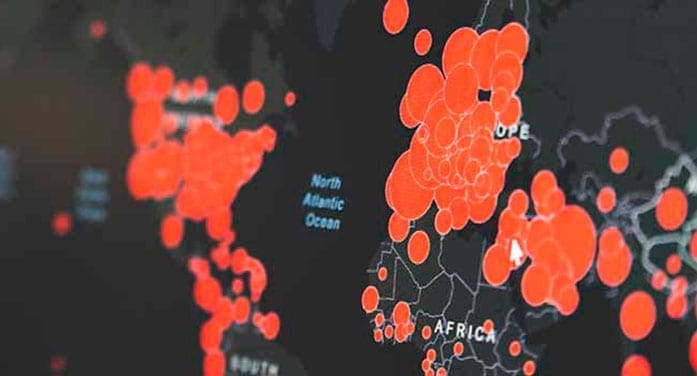Most of the nations in the developed world, including Canada, were unprepared for the deadly COVID-19 pandemic. So we need to examine what steps should be taken to forestall or substantially mitigate the next microbial conflagration.
While the current main weapon – the medieval quarantine – might still be part of the future arsenal, more steps can or should be taken.
Our leaders should have ways to handle a public health disaster without throwing half the population into penury, and pushing most of the nation’s small businesses to the brink of bankruptcy.
The first line of defence is to be on the alert for disease outbreaks around the world. That includes monitoring the avenues a deadly virus, bacterium, rare fungus or prion-type biochemical agent could take to infect Canadians – or people in the many other nations with significant trade and flows of people with and to Canada.
Particular attention should be given to those regions with a history of transferring exotic contagions from animals to people. China has such a history, with SARS and now COVID-19; so does central Africa, where Ebola and HIV came from; and other places such as Southeast Asia and tropical Latin America are also possible hot spots.
Information and medical statistics from some nations with undemocratic, authoritarian, non-transparent, corrupt or unaccountable governments should be assessed carefully and skeptically.
China, for instance, didn’t tell the world that COVID-19 was spreading widely in Wuhan, where it started, until late December. As late as the middle of January, it was still publicly insisting that there was no evidence of human-to-human transmission, even when it knew otherwise.
This assertion was at first uncritically repeated by the World Health Organization (WHO), before being refuted. WHO can’t be relied on for accurate information, since it seems to not want to offend major donors.
When a microbe is authoritatively identified and genomically decoded, diagnostic tests need to be primed and ready to go. Quick production and national distribution of speedy, accurate tests must then be a priority. We need to ensure authorities can detect and send to treatment people who are infected or carriers of the contagion.
Once a disease is identified as a threat, health authorities must be quickly told the specific symptoms so staff at other ports of entry into Canada can be prepared.
Travellers from regions where the disease is spreading rapidly should be required to isolate at home for a particularly period. In the case of COVID-19, it’s 14 days; that could be shorter or longer for another ailment.
There should also be a hefty fine for escaping the quarantine. Police should ensure people stay at home. This may seem a violation of civil liberties, but we’re experiencing even worse constrictions, and a severe recession, right now.
When infected travellers start to jump in numbers, travel bans need to be enacted immediately.
There should also be adequate medical supplies and personal protection equipment (PPE). Some of these items degrade over time, so they need to be replenished on a rolling basis. The current inventories are plainly far too low for a pandemic.
Other items, such as ventilators, might be specific to COVID-19, but medical professionals should be able to identify a variety of equipment that could be necessary. Then generous numbers of these items should be purchased. The expense is unlikely to be of the magnitude of the financial and medical disaster we’re now experiencing.
The financial aspect of all this should be examined in a hard-headed way. Instead of a wild scramble to borrow and fund a huge bailout for nearly everything, a national emergency insurance fund could be established. Several billion dollars could be sequestered each year.
The federal government could also establish business interruption insurance, in conjunction with the property and casualty or general insurance industry. Small businesses should find it easy and only incrementally more expensive to buy insurance with such a feature.
Finally, Canada must be less dependent on other nations, especially semi-adversaries such as China, for medical supplies and equipment, diagnostics, pharmaceuticals and other critical things.
It should also not be dependent on nations whose manufacturing capability might be debilitated by the disease outbreak – as China also is. Other nations are trying to keep these products for themselves, and are having trouble manufacturing all that is needed.
Secure and ample supply chains are vital. Canada it seems can’t rely on the kindness of strangers – or even friends and allies. Local, vibrant innovative suppliers should be nurtured.
Ian Madsen is a senior policy analyst with the Frontier Centre for Public Policy.
The views, opinions and positions expressed by columnists and contributors are the author’s alone. They do not inherently or expressly reflect the views, opinions and/or positions of our publication.


